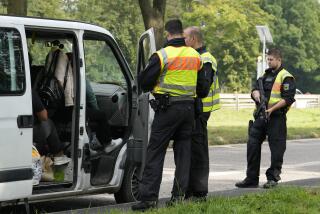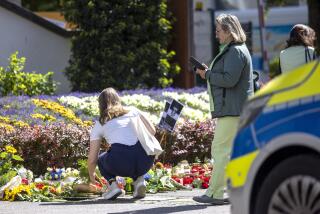As migrants arrive, Germany’s embrace of refugees spurs backlash
Reporting from Nauen, Germany — It seemed a modest proposal, turning part of a sports center in this town of 20,000 people into a temporary shelter for about 130 migrants and refugees.
Someone, however, apparently decided it would be better for none of Nauen’s residents to use the center rather than let a single asylum seeker through its doors. Last week, the building was set ablaze and destroyed in a suspected arson attack — another addition to the mounting tally of assaults on facilities set up to help Germany’s newest arrivals.
The fire blackened not just the 4-year-old sports center but also, some residents fear, the reputation of this community just west of Berlin.
“This is just blind ignorance and fanaticism,” said Katja Dreller, 28, a kindergarten worker. “I’d mostly blame it on ignorance and lack of interaction with the outside world. Some people here have never left Nauen, and they are panicking at the prospect of what would have happened if refugees came to live among them.”
It’s an increasingly common prospect across this land of 80 million people, for the attack in Nauen reflected two competing realities: the intolerance of some Germans for the newcomers in their midst and, at the same time, German generosity in Europe’s biggest migrant crisis since World War II.
Mindful of its shameful conduct during that war, when the Nazis tried to exterminate whole classes of people they deemed undesirable, Germany is taking the opposite tack now by opening its arms to more refugees than any other country in Europe. In the process, it’s becoming what one British commentator called the continent’s unlikely moral beacon as other nations scramble to shut their borders and the European Union dithers on a collective approach to the crisis.
The German government now says it expects a staggering 800,000 asylum requests this year, more than double its forecast at the beginning of 2015. The figure amounts to 1% of Germany’s entire population; the equivalent in the U.S. would be 3.2 million people. Most of the requests are expected to be approved.
Many of the asylum seekers are Syrians fleeing the civil war at home. In a major departure from normal EU procedure, Berlin announced that it would allow Syrians streaming into Germany to apply for asylum here rather than ship them back to the country where they first entered Europe. The gesture sparked an outpouring of gratitude on social media from Syrians who tweeted images of Chancellor Angela Merkel and the words “We love you.”
“It will be the largest influx in the country’s postwar history,” Thomas de Maiziere, the German interior minister, said recently. “We can master this challenge. I don’t think this will overwhelm Germany; we can handle this.”
But Germany has also warned that it won’t shoulder the burden alone, and called on its neighbors to step up to the plate. “Europe as a whole must move, and its states must share the responsibility for refugees seeking asylum,” Merkel said Monday, warning that the lack of a unified response could endanger the cherished principle of free movement across EU borders.
So far, the migrant crisis has made a mockery of the European Union, with as many policies toward migrants and refugees as there are countries within the 28-member EU, as the Italian prime minister put it.
Whereas Germany has pledged to take in 800,000 refugees, Hungary and Bulgaria are building walls to keep migrants out. Last year, Sweden welcomed more asylum seekers — 81,000 — on a per capita basis than even Germany, while Britain resettled just 187 Syrians under a program to protect those considered the most vulnerable to persecution at home. Slovakia says it will accept 200 Syrians, but only if they’re Christians.
Despite that chaotic response, thousands of Syrians, Iraqis, Afghans, Eritreans and others continue to land on the shores of Southern Europe each day after terrifying sea journeys, often winding up in squalid camps and reception centers.
Many press on northward to more affluent countries such as Germany and Sweden but face further perils. Last week, 71 people presumed to be migrants apparently suffocated to death in the back of a truck found abandoned by the side of an Austrian highway. Five people suspected to be part of a vast trafficking ring have been arrested.
The EU has called an emergency meeting of justice and interior ministers Sept. 14 to try to forge a common plan of action.
“The European Union cannot and should not be blamed for the migration crisis, but we need to do more at European level to solve it,” EU President Donald Tusk said during a visit to Slovenia on Monday. “This is a very complex problem and requires a complex set of actions. There are no quick fixes. Had there been, they would have been used [a] long time ago.”
NEWSLETTER: Get the day’s top headlines from Times Editor Davan Maharaj >>
Whether the countries can agree on anything — even at the prodding of Germany, Europe’s biggest economy and the most powerful player within the EU — remains to be seen. A refugee quota system suggested recently by some European officials met with immediate and vociferous resistance by nations such as Britain and France, whose governments are worried about losing votes to right-wing anti-immigration parties opposed to any system that gives migrants a path into their countries.
“If we take past experiences as any sort of indication, then the hopes are not necessarily high,” said Astrid Ziebarth, a migration expert in Berlin with the German Marshall Fund of the United States. “Germany is fully behind the quota plans.... I don’t know what sticks and carrots they will use” to try to get other countries to accede.
Merkel now describes the migrant crisis as the biggest challenge facing the EU, greater than the Greek debt crisis that once threatened the survival of the euro common currency.
The two big political parties in Germany are in agreement over embracing the hundreds of thousands of asylum seekers expected this year.
But the decision has fueled a spate of xenophobic attacks and raised the specter of neo-Nazi networks spreading their tentacles. More anti-foreigner incidents were reported in the first six months of 2015 — about 200 — than all of last year.
In late August, violent demonstrations erupted in the eastern German town of Heidenau, where a shelter for 600 refugees was being readied, and 31 police officers were injured. When Merkel visited the town days later and denounced the protests as “shameful and repulsive,” onlookers booed and called her a “traitor.”
Suspected right-wing extremists also torched refugee centers in the historic city of Meissen and in the southern Bavarian town of Reichertshofen days before they were to open.
Officials and others say that the attacks represent the sentiment of a minority. Polls show that 60% of Germans support taking in refugees, and there has been an outpouring of assistance across the country from volunteers who have donated food and clothing, set up websites to match migrants with employers and even housed some of the newcomers in their own homes.
Even Germany’s most populist tabloids have joined the chorus, running stories trying to dispel misperceptions about refugees and condemning violence against them.
“We’re helping,” the mass-circulation Bild said in a front-page headline on a story on the altruistic efforts of ordinary Germans.
Attitudes toward foreigners have become more liberal in recent years with the increasing visibility and political activism of the millions of “guest workers” whom Germany invited, from countries such as Turkey, to help build its economy in the 1960s and ‘70s.
“Twenty years ago, nothing of that [voluntarism] could have happened. So Germany is in a learning process,” said Hajo Funke, a political scientist at Free University Berlin.
The backlash against migrants has largely surfaced in parts of the former East Germany, which remain economically behind the western part of the country.
Nico Jung, 48, has lived all his life in Nauen, where he owns a bicycle shop.
The burning down of the sports center was “horrible,” he said, but “the whole situation with bringing in immigrants is new to people here.”
“The image many here have is that immigrants are people who come without any qualifications, no job, no income and probably no future. Some are afraid that those immigrants might indulge in some criminal acts, and others are afraid that the cultural identity of the town might be lost,” Jung said. “There is a lot of fear, and that fear is what prompts some people to carry out stupid acts.”
Local officials have posted a nearly $25,000 reward for information leading to the arrest of the arsonist.
It’s unclear whether the town will try to find another facility to replace the sports center as a refugee shelter. Dreller, the kindergarten worker, said it might not be possible now.
“The government should have asked the community or at least spread some sort of awareness about the matter before any plans were made to bring in refugees here,” she said. “Now it is a bit of a predicament, because the situation has already been given a bad reputation, and I’m not sure how safe it will be for anyone if refugees end up getting settled here.”
Special correspondent Hassan reported from Nauen and Times staff writer Chu from London.
ALSO:
Polish authorities seal off area believed to hide lost Nazi gold train
Ukraine move to cede powers to pro-Russia rebels sparks deadly melee
At a Macedonian way station, Syrian and other migrants focus on the path ahead
More to Read
Sign up for Essential California
The most important California stories and recommendations in your inbox every morning.
You may occasionally receive promotional content from the Los Angeles Times.











